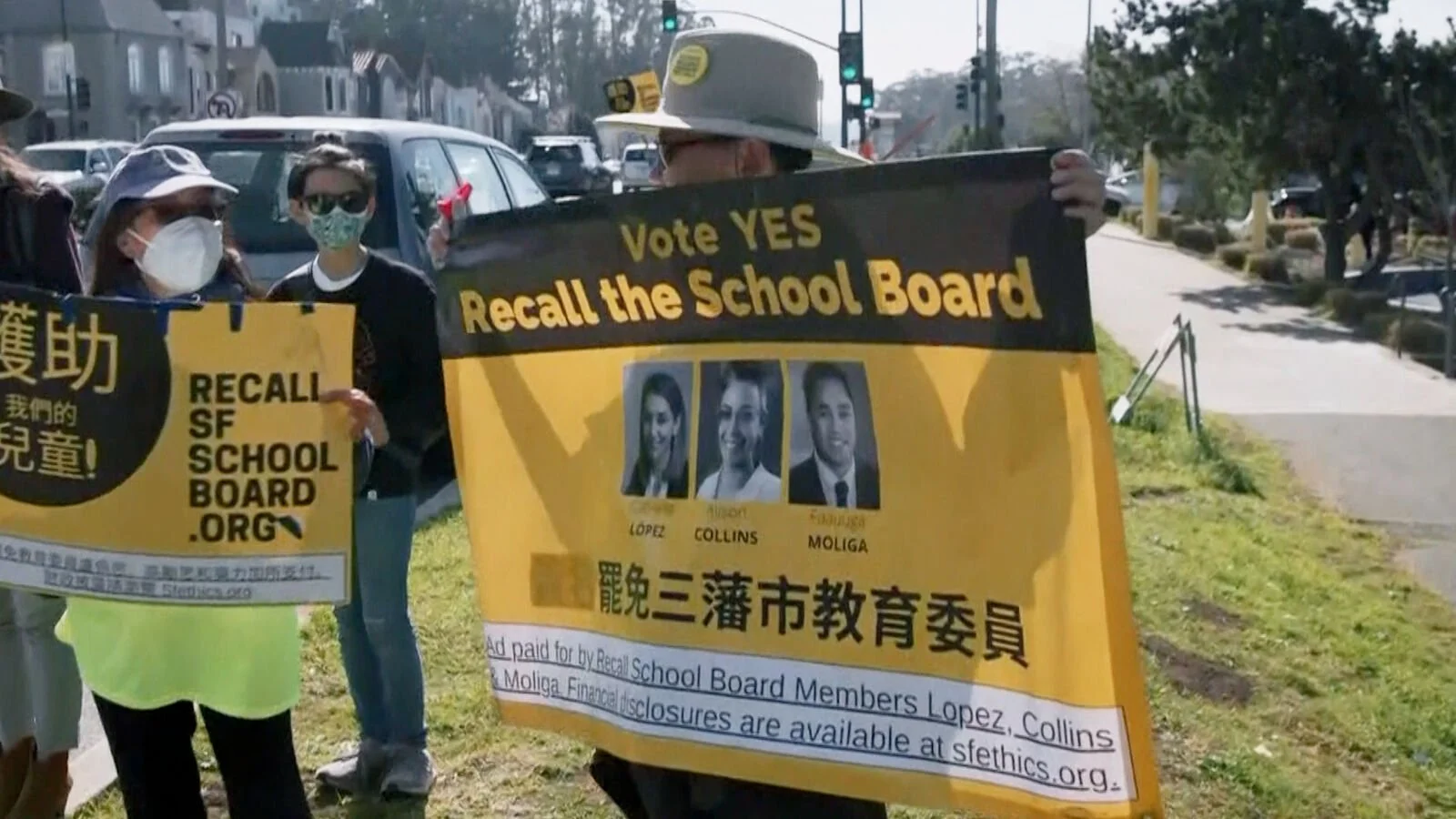San Francisco’s Recall of 3 School Board Members Underscores Education as a Political Issue
Asian American voters in San Francisco protesting three members of the school board. Source: KIMATV
On February 15th, the city of San Francisco held its first recall elections since 1983. This special election asked voters to decide whether three San Francisco school board members should serve out the rest of their term or be withdrawn from public office. Voters recalled all three members, school board President Gabriela López, Vice President Faauuga Moliga, and Commissioner Alison Collins, by overwhelming margins.
The vote to recall members was over 72% in each election, making public sentiments quite clear. Still, the motivations behind the recall effort are not singular, rather multiple instances brought voters out to vote ‘Yes’ on recall.
Proponents of recall did so because of what they deemed “misplaced priorities.” Last January, the school board sought to rename 44 schools, or about one-third of all San Francisco public schools. The school board’s reason to rename these schools was because the current names honored figures linked to “racism, sexism, or inhibiting societal progress.” Notably, schools named after Thomas Jefferson, George Washington, Abraham Lincoln, and California Senator Dianne Feinstein were set to be renamed. However, the plan was eventually scrapped as some in the public and San Francisco mayor London Breed came out against the plan.
Breed called the move “offensive” as schools remained closed during that time and had not prioritized re-opening the classroom. In fact, the school board met over 10 times to discuss changing school names while San Francisco schools were closed for 17 months. Critics of the school board also argued that San Francisco schools were some of the last in the country to re-open.
Furthermore, the school board scrapped merit-based admissions to Lowell High School — a school for high achieving students that is recognized as one of the best public schools in the country. In December 2021, the school board opted to make a temporary random lottery admissions system for Lowell permanent as opposed to the previous merit system. However, this decision was met with severe scrutiny from San Francisco’s Asian population — who saw the move as discriminatory.
A majority of Lowell High’s students are of Asian lineage. In fact, Asian students make up 50% of the 2,800-person student population. The change, meant to “diversify the student body,” was met with strong resistance. This particular issue drove a high turnout for San Francisco’s Asian population, yet it was not the only factor influencing the vote.
Tweets by school board Vice President Collins from 2016 resurfaced in early 2021 and further fueled the recall effort. Collins tweeted that Asian Americans use “white supremacist thinking to assimilate and get ahead.” After that surfaced, the board stripped her of her VP title. Collins responded by filing a $87 million lawsuit against the board and city. This suit was dismissed by a judge.
All in all, these actions created an atmosphere in which many parents and voters felt that the board was not focused on its original purpose. Schools remained closed, merit admissions to an elite high school were altered, and Collins’ $87 million lawsuit made the board appear “distracted.” That being said, this recall election can be helpful to draw insights on the nation as a whole.
Education will likely be a potent issue in the leadup to the midterm elections, but the recall in San Francisco was less concerned with alleged culture war items such as critical race theory. Instead, the election focused on government competence and fostering a better educational atmosphere for children. After all, San Francisco is one of the most liberal cities in America, 85% of votes cast in the 2020 presidential election were for Joe Biden.
School closures and remote learning were disruptive to children and parents alike. Closing schools again for another wave of Covid-19 would likely be politically perilous for the bodies in power. Instead, today’s education issues regard mask mandates in schools. While everyone wants children to have a strong educational experience, balancing Covid-19 safety and normalcy encompasses the current political battle.
That being said, the side favoring a “return to normalcy” may be winning. Recently, a wave of “blue” states have begun to move away from statewide mask mandates for school children. This comes on the heels of recently published polling conducted by the Democratic Congressional Campaign Committee (DCCC). In that poll, 66% of swing voters agreed with the statement that “Democrats in Congress have taken things too far with their pandemic response.”
Heading into the midterm elections, the Democrat majority must be conscientious of where the public stands on education issues. Likewise, Republicans will look to it as an inflammatory issue for which they can possibly garner support. So be on the lookout for incumbent Democrats across the nation as they may begin to alter some of their Covid policies. If this polling is correct and they fail to do so, voters will likely punish them at the ballot box.

